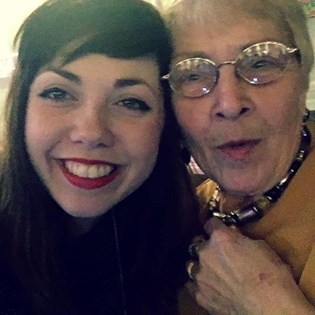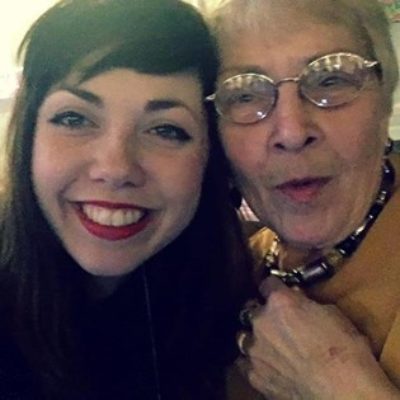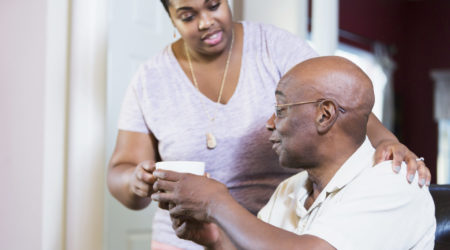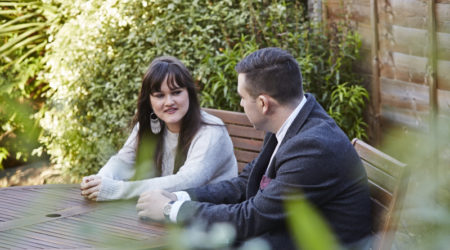



Kirsty & Joyce
Kirsty tells the story of her Nan, Joyce's, experience of pancreatic cancer.
Three months ago a very big part of me died.
My Nan, like most Nans, was a second mother to me, but so much more in my case. She was an absolute hero during my childhood, I lived with her until I was 12 with my Mum too but she worked a lot; my Nan was my biggest inspiration during early life.
My Nan’s diagnosis was a shock
She was diagnosed 16 months beforehand, with stage 3 pancreatic cancer, in March 2016. The day after my Uncle’s 50th party where she partied the night away like she always did.
It was a shock when she told us, in fact she didn’t even tell me directly, my Mum did. Well she didn’t even tell us very much ever – she was a ‘let’s deal with this when we need to’ person. To me I was baffled. What is stage 3 anyway? How many even are there?
She was very blasé about her inoperable cancer, so much so I almost believed that things would be OK. After self-diagnosing her diabetes a couple of years prior, and forcing the doctors to address it, there’s no doubt she had an inkling what was happening before she went to see the oncologist. My Mum said she went in so calmly and came out very determined like she had something to prove.
Having chemotherapy
OK so what’s next? The question pretty much all of us were ready and keen to get going with. The answer was chemo – a lighter dose to prolong life expectancy (of which we did not know). Straight away, like the week after, she was in a chair hooked up to a bunch of tubes like someone had taken the dancing Nan of the weekend before and launched her into old age quicker than anyone could say “no cure”.
A couple of weeks in, she experienced some complications with the chemo and had to stop for a couple of weeks before trying again. Her diabetes was having a party with the chemo making blood sugar levels dance about, causing its own contribution to her ill health. She slept a lot during this phase. It aged her. Not so much in how she looked but how she felt. She was a ‘get up early and let’s get things done’ kind of lady, a keen gardener and was never off her feet. Chemo made her ‘lazy’ in her mind and she was annoyed how much sleep she needed.
Radiotherapy
Eventually chemo was over. A bit thinner now (always the cuddly one was my Nan), and a bit weaker, she still seemed like she could/would get on that dance floor again and rock out with the best of them. Again it was so easy to believe her blasé approach to this cancer, that had barged its way into our family and caused so much fuss already – what could possibly be next?
Well it was radiotherapy next. I remember this one more distinctly as my Nan lived 13 miles from the cancer unit she needed to attend once a day, every day for six weeks, and so Mum had to clear her diary in order to accommodate as much of this as possible. She had a little marking made where they needed to shoot the laser, and told me it was her tattoo. Laughing still as she made her way through more treatment, chatting up the doctors as she went, despite knowing the reality.
Counselling became a lifeline for me
Around 4 months after radiotherapy, the New Year, Nan took a turn for the worse. I panicked and remember feeling and thinking for the first time; she is going to die, and what’s worse, it’s going to be soon.
The issue was a blocked bile duct, causing extreme jaundice and huge pain in her abdomen (which beforehand she had been keeping much more to herself than I would have liked). This was the first time I really considered an existence without her in it; it was unbearable and drove me to extreme anxiety, along with my Mum seriously not handling it herself. So I turned to counseling for help.
The counseling at first was a relief. Then it became a lifeline.
I also live 200 miles away from the family. Every visit, each month or so, it became more apparent how bad it was getting. The weight loss, the lack of appetite and the mental deterioration/confusion was heart breaking. The last visit I made, she looked almost skeletal, like she’d died already.
With the endless visits, Macmillan nurses, district nurses, doctors, friends and family it can be so busy you have no time to even think about what is going on. Just keep plodding. Mum spent a lot of Nan’s last few weeks dedicating her entire life to her care (no sleep, work, eating etc.) and I honestly think she’s a hero for what she did in those weeks.
The end came so quickly after stage 4 got its hands on her. Unbeknownst to us, it had spread to her lungs and liver. Again Nan didn’t tell us it became metastatic until the doctor came to sign her Do Not Resuscitate forms with ‘one week to live’. Nan didn’t want anyone to worry unnecessarily and that was that.
Coming to terms with my loss
My Nan is now dead. My grief counselor told me afterwards it is useful to keep saying she is dead. Speaking of her in the past tense and saying words death/dead/died to eventually convince myself of its reality. It hasn’t worked yet — I’m still confused as to where she is, and simply can’t fathom the fact I won’t ever see her, hug her or hear her voice again.
I was there when she died, a few days after. All of a sudden her breathing changed from the slow, uncomfortable cheyne stoking (irregular) breathing to a very fast paced pant and then nothing. I’ve never seen anybody die before. But I’m glad I was there, as I know she felt comfort in us being around her. Despite everything she’d been through in those 16 months she was laughing even in those final days. I honestly don’t know how we will cope without such an amazing person.
October 2017




